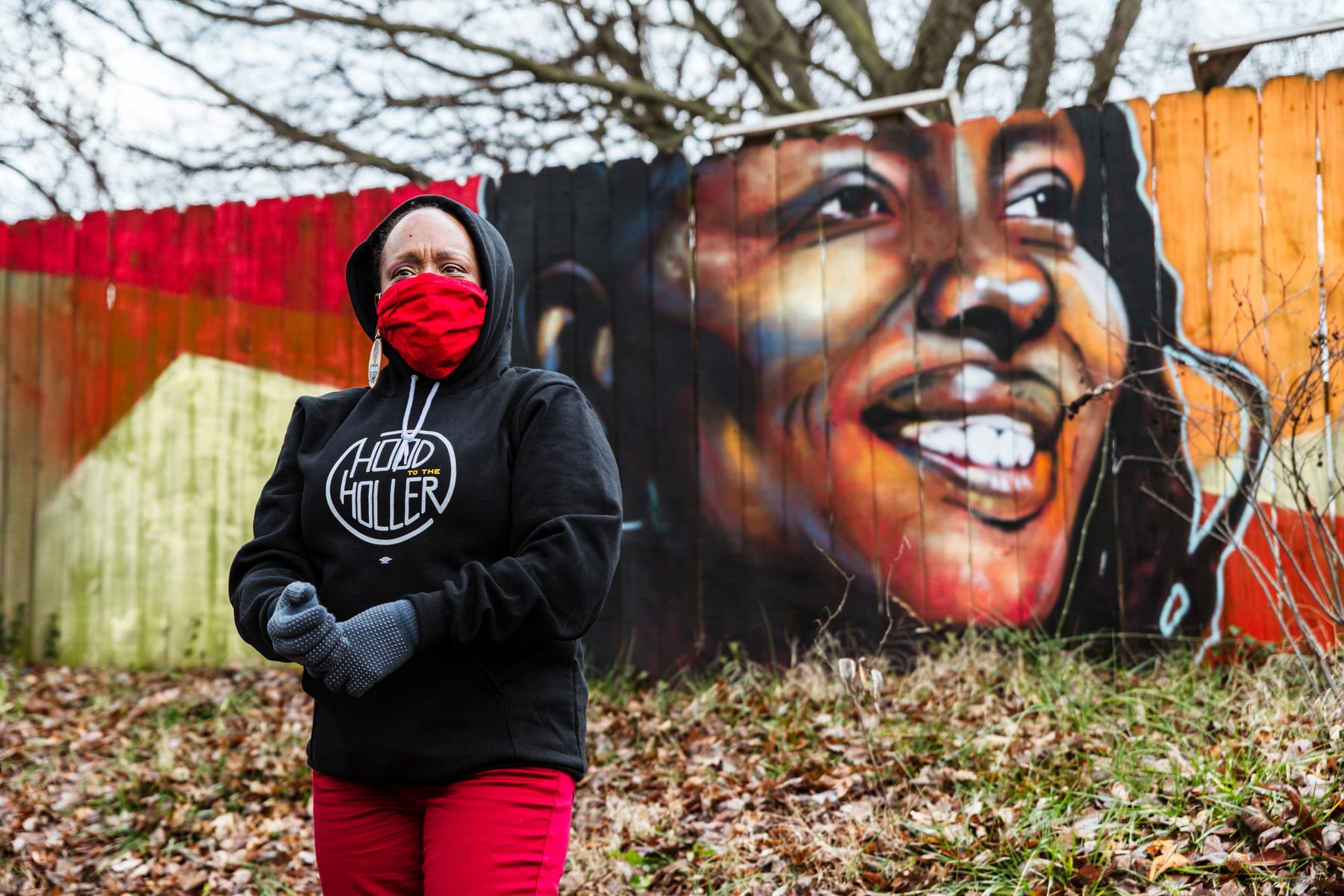Nearly one year after Breonna Taylor was killed during a botched police raid inside her apartment in Louisville, Kentucky, Attica Scott is still seeking justice.
Scott, a state lawmaker who represents part of Louisville, watched over the past year as her constituents protested and marched after the death of Taylor, a 26-year-old emergency room technician. She joined them as they demanded accountability for police actions that led to Taylor’s death and the deaths of other Black Americans around the country.
For Scott, a bill she has introduced in Taylor’s honor — Breonna’s Law — would be a start.
“This is something that touched me deeply as a mother of a Black daughter, that another mother’s daughter was murdered,” Scott said. “So it tugged at me personally as a mama. It touched me as a legislator representing people who have been fighting for justice for her, and I truly believe that through this policy we can make sure that we protect people across Kentucky.”
Breonna’s Law, if enacted, would ban Kentucky police from using “no-knock” search warrants, requiring them to knock and wait at least 10 seconds “or for a reasonable amount of time” for occupants to respond before entering a property. It also requires police to wear activated body cameras before and after serving a warrant and to be tested for drugs and alcohol any time they shoot their guns or are involved in a deadly incident.
Law enforcement burst into Taylor’s apartment after midnight on March 13, 2020, as part of a drug investigation related to an ex-boyfriend of Taylor’s who did not live in the home. Taylor was killed when officers shot multiple bullets into her home.
Kenneth Walker, Taylor’s boyfriend who was in the apartment and fired his licensed gun at police, said law enforcement did not identify themselves before they entered. Kentucky Attorney General Daniel Cameron has disputed that, claiming that officers both knocked and identified themselves. There is no body cam footage from the raid. No officers were charged criminally in her death.
But time is running out this year in Kentucky for the bill that would be Breonna’s Law. The legislation, as of mid-February, has not had a public hearing in the statehouse. And while lawmakers, according to Scott, have privately expressed a willingness to consider provisions of the bill, it’s unclear for now what will advance. Lawmakers are set to adjourn at the end of March.
“I’m not giving up, at all,” Scott said.
Scott, a Democrat and one of just two Black women in the 138-member Kentucky legislature, recognizes the uphill climb in a state Capitol where Republicans have large majorities in both chambers. But she believes in the power of community organizing to pressure lawmakers to consider the legislation before they wrap up the session. She has also met several times with Republican leaders about the bill, and she said she is scheduled to meet with them again in late February. She wants to get the bill assigned to a legislative committee, which will allow for more public debate, and as she explained it, “where it can be heard and have a chance for us to share Breonna’s story.”
Charles Booker, who was in the state legislature before unsuccessfully running last year for the U.S. Senate seat held by Mitch McConnell, is working with Scott to advocate for Breonna’s Law. He said Taylor’s case resonates with so many people because of the circumstances surrounding her life and death: She was an essential worker amid the beginning of a global pandemic who was killed in her home, where she should have been safe.
Booker also noted that grassroots organizing in Kentucky has been growing for years following protests over issues like teacher working conditions, climate change and coal mining worker pay.
“It’s a cumulative effect of a lot of folks feeling the need and urgency of speaking up, organizing and taking action and leading in the community,” he said.
Taylor’s death sparked legislation and policy changes around the country, primarily around the use of no-knock warrants. Last June, Louisville’s city council unanimously passed a ban on no-knock warrants that also requires body cameras when warrants are served.. U.S. Sen. Rand Paul of Kentucky, a Republican, filed a federal bill to ban no-knock warrants last June. In July, police departments in Indianapolis and Orlando announced plans to end no-knock warrants. In December, Virginia became the first state to enact a law named after Taylor
“It’s happening in other places, and I think it’s a damn shame if it doesn’t happen here,” said Shameka Parrish-Wright, a community organizer who has been active in seeking justice for Taylor and is now running for mayor of Louisville. “ … Everybody knows that something has to be done, and we have to be willing to be bold and innovative.”
Scott estimates she has attended dozens of marches, protests and rallies since last March related to the Black Lives Matter movement and Taylor.
“We have to build our collective power across Kentucky,” Scott said. “I’m committed to doing that. So I’m going to show up when people call.”
In September, Scott and her then 19-year-old daughter were arrested during a protest after a grand jury decided not to indict any officers directly in the shooting death of Taylor. Louisville police accused them of rioting and trying to burn down a library, although video debunked that. The charges were later dropped.
The arrest was traumatic, but Scott has continued to march and protest, and so have others. She said she’s never seen so much community organizing around legislation aimed at police accountability. She has co-sponsored separate bills aimed at protecting the rights of people involved in protests and adding new standards around how police respond to protests. But the focus has been Breonna’s Law, and community groups like Booker’s Hood to the Holler and Kentuckians for the Commonwealth are working with Scott to organize people.
“It has been powered by the people, and Breonna has been that catalyst for the change that we are seeking,” Scott said.
When Scott was first elected to the statehouse in 2016, she was the first Black woman elected to the state legislature in 20 years. Scott said that in her four years at the statehouse, all in the out-of-power party, none of her bills have been scheduled for public hearings. This year, she also helped draft a resolution declaring racism a public health and safety crisis in the state. The chamber has not passed the resolution.
“It’s emotionally hard and emotionally taxing,” Scott said of her statehouse work. “I want to do right by my people. I want to do right by the people who have elected me to serve. I want to do right by the people that know that they don’t have a lot of folks in the People’s House who are actually advocating for them and working to be their champion.”
Booker, who also lives in Louisville, said he used to carpool with Scott to and from the state Capitol in Frankfort. It’s a daily two-hour drive.
“She’s always that person to fight for justice,” Booker said of Scott. “She’s the one that calls it out in every situation. She’s been by herself in a lot of ways in the legislature.”
It’s possible a ban on no-knock warrants could happen in Kentucky this year, though the legislation may not be Scott’s.
Robert Stivers, the state Senate president, said at a news conference last summer that there was bipartisan support for a bill to ban no-knock warrants with exemptions, and promised to file a bill in January. That has not yet happened. Neither he nor House Speaker David Osborne responded to multiple requests for comment.
Keturah Herron is a policy analyst for the American Civil Liberties Union of Kentucky who helped draft Louisville’s Breonna’s Law ordinance. Herron, who is now lobbying for statewide legislation, said Kentucky policymakers should ensure that there is community support for any major changes to Breonna’s Law.
“All of our legislators, whether they’re Democrats or Republicans, need to be legislating for what’s going to ensure justice,” she said.
Scott said she is willing to support a separate bill that bans no-knock warrants, but she wants to see a specific proposal to further comment. She hopes lawmakers will ensure that whatever legislation advances, it’s renamed in honor of Taylor. As far as she knows, no legislation in Kentucky is named after a Black woman.
In the meantime, Scott won’t give up on her bill. She’s joining organizing calls after long days at the statehouse. She has spoken to council members and officials representing several Kentucky cities about passing local resolutions in support of a statewide Breonna’s Law.
Scott acknowledges that Breonna’s Law faces barriers at the Kentucky statehouse this session. She said it’s important to acknowledge the impact of so few Black people and people of color in the state legislature when it comes to addressing racial justice.
“It really is institutional and systemic racism in our legislative body. Where you have a White majority of Republicans that is about performative politics, but isn’t about truly transforming the way that our commonwealth functions. That isn’t truly about listening to the people who are most directly impacted and who are crying out in pain and crying out for justice,” she said.“That touches me at my core, at my heart, at my whole being.”





